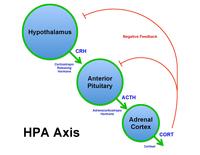
Photo from wikipedia
Graphical abstract Figure. No Caption available. HighlightsIt was the first time to evaluate the effects of restraint stress on the performance of reward‐motivated instrumental learning tasks of rats.Chronic restraint stress… Click to show full abstract
Graphical abstract Figure. No Caption available. HighlightsIt was the first time to evaluate the effects of restraint stress on the performance of reward‐motivated instrumental learning tasks of rats.Chronic restraint stress influenced the Pavlovian conditioning, acquisition and maintenance of instrumental conditioning task of rats.The learning ability of rats faced in higher fixed ratio schedule of instrumental learning task was impaired by chronic restraint stress.Chronic stress induced bad performances in instrumental learning tasks might be related to the reduced motivation and cognitive function. ABSTRACT Chronic mild or unpredictability stress produces a persistent depressive‐like state. The main symptoms of depression include weight loss, despair, anhedonia, diminished motivation and mild cognition impairment, which could influence the ability of reward‐related learning. In the present study, we aimed to evaluate the effects of chronic restraint stress on the performance of reward‐related learning of rats. We used the exposure of repeated restraint stress (6 h/day, for 28 days) to induce depression‐like behavior in rats. Then designed tasks including Pavlovian conditioning (magazine head entries), acquisition and maintenance of instrumental conditioning (lever pressing) and goal directed learning (higher fixed ratio schedule of reinforcement) to study the effects of chronic restraint stress. The results indicated that chronic restraint stress influenced rats in those aspects including the acquisition of a Pavlovian stimulus‐outcome (S‐O) association, the formation and maintenance of action‐outcome (A‐O) causal relation and the ability of learning in higher fixed ratio schedule. In conclusion, depression could influence the performances in reward‐related learning obviously and the series of instrumental learning tasks may have potential as a method to evaluate cognitive changes in depression.
Journal Title: Behavioural Brain Research
Year Published: 2017
Link to full text (if available)
Share on Social Media: Sign Up to like & get
recommendations!